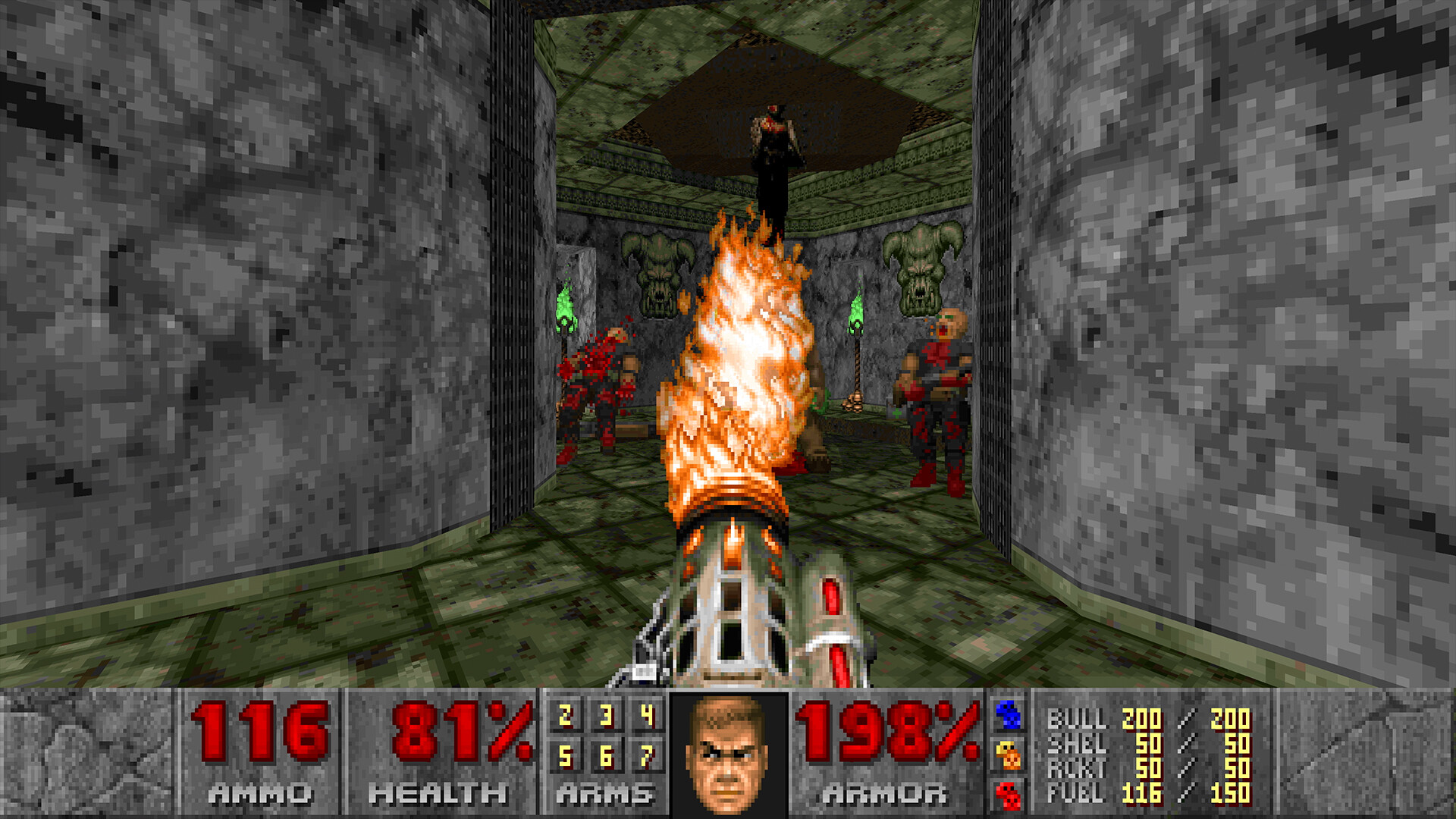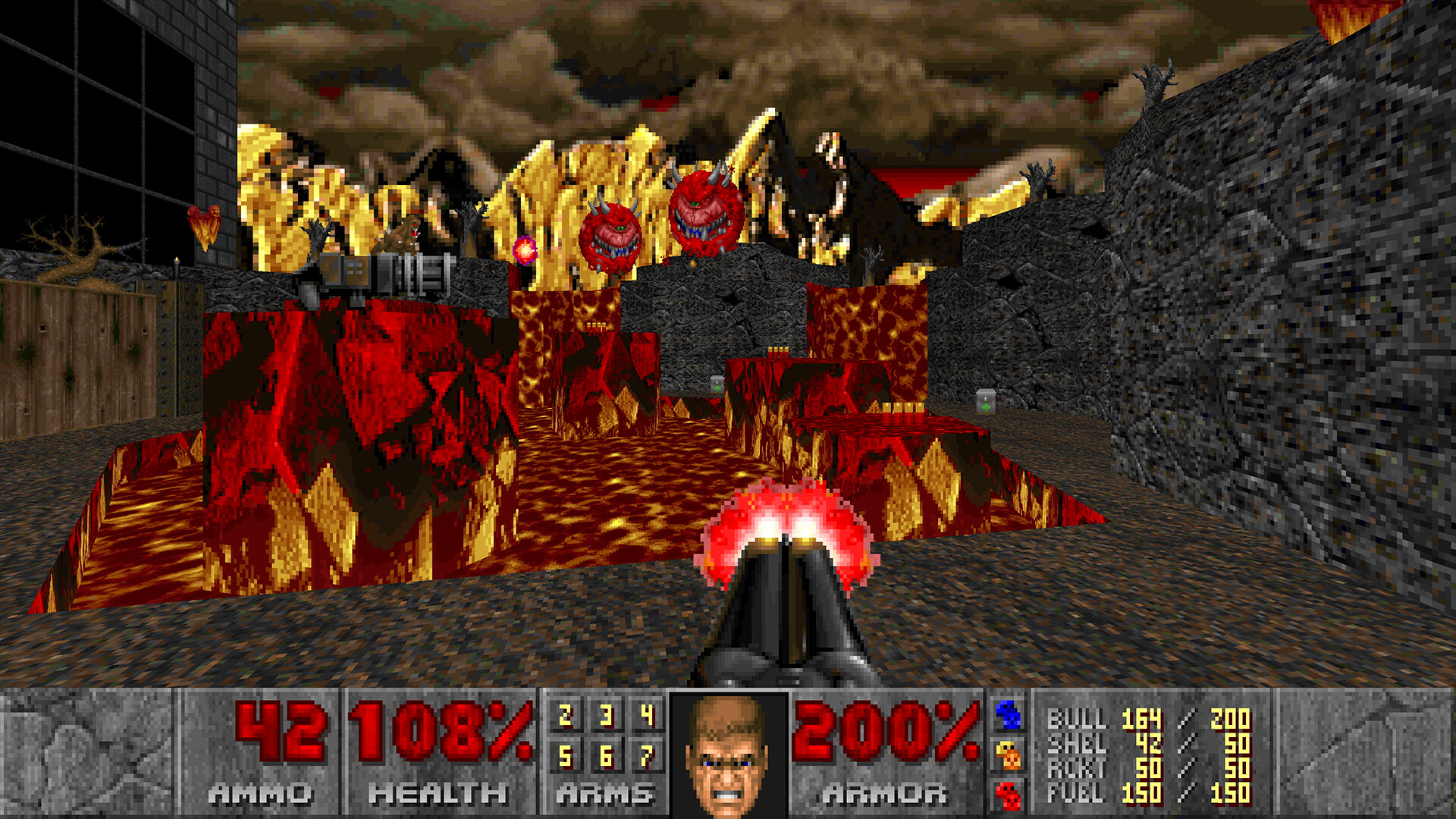Like last year with Quake 2, id Software has shadow-dropped enhanced editions for some of its most beloved shooters, this time focusing on the original two Doom games. Interestingly enough, this is the second major update for both titles – the last added tons of features like level select, Quick Save and Quick Load, 60 FPS support on all platforms, and additional campaigns like No Rest for the Living, Sigil and both map packs constituting Final Doom. How does DOOM 1 + DOOM 2 fare in comparison?
Right off the bat, you get support for 4K/120 Hz on current-gen consoles and PC, cross-platform multiplayer and co-op, several accessibility options (including high-contrast mode and text-to-speech/speech-to-text for multiplayer), and support for eight new languages. If you want to learn more about the development of each game or delve into all of the character sprites, backgrounds, and more, the id Vault collects it all in one neat place.
“However, everyone else logging back in will doubtless pivot to Legacy of Rust, the new campaign. The story, such as it is, sees the player aiming to reclaim a lost UAC base.”
Those craving more Doom content get a brand new campaign developed collaboratively by Nightdive, MachineGames and id Software. There’s also a new Deathmatch pack for multiplayer fans, adding 25 new maps, and, perhaps best of all, compatibility for BOOM, allowing mods to be shared and downloaded in-game. If that wasn’t enough, a newly remixed soundtrack by Andrew Hulshut (who’s composed tracks for Rise of the Triad, Prodeus, Dusk, Amid Evil, and more throughout the years) is also available in addition to the classic MIDI tunes.
Based on the original games alone, DOOM 1 + DOOM 2 is worth playing for newcomers. Everything from the level design to the enemies and pacing still feels so sublime after all these decades that it’s incredible. Of course, even if you played the originals or their re-releases but haven’t delved into the add-ons, they’re worth playing. No Rest for the Living is essentially more Doom 2 with a larger number of enemies on-screen and slight twists on its level design.
Final Doom feels a nice evolution on the core Doom formula, maintaining a solid pace, while playing around more with environmental concepts and challenges. Perhaps the only real point of consternation is Sigil – it’s not bad but offers a different kind of Doom experience. It still warrants a playthrough for the eye-catching effects and attention to detail. Sigil 2 is also available as a featured mod, which is a nice gesture.
However, everyone else logging back in will doubtless pivot to Legacy of Rust, the new campaign. The story, such as it is, sees the player aiming to reclaim a lost UAC base. Ancient horrors are afoot, and while it’s all window dressing for the action, there’s still some interesting environmental story-telling. Gunning through Scar Base and taking out the Former Humans, Pinkies, and Ghouls (which are new), you spot several hanging bodies. One hop, skip and jump through a portal later, and more carnage is revealed, from impaled soldiers to piles of corpses.
“Doom is a game that’s seen an unbelievable amount of mod support throughout the years, spawning everything from brand-new campaigns to total conversions that fundamentally change the experience.”
The new flourishes stand out, but the classic Doom aesthetic is still in play. Perhaps most impressive is how each level feels structured and unique. Scar Base is the jumping-off point into the Sanguine Wastes, a festering landscape of blood pools where enemies seemingly lurk everywhere, creating a harrowing atmosphere over a lengthy period.
By comparison, Ash Mill is shorter but no less terrifying as you navigate through a twisted lumber mill and various desiccated trees, battling the new Shocktroopers. Out of all the sections in these levels, perhaps a handful stood out as somewhat off, but the rest is prime Doom-level design. Though there are only two new weapons – the Calamity Blade and Incinerator – they’re fun to use.
There’s nothing quite like facing down incoming hordes, firing off a single charged blade and watching it effortlessly slice through them. On that note, even the new enemies slot effortlessly in, with the Vassago perhaps the most imposing when you’re running low on ammo and trying to scrounge for more. I felt a bit divided on Call of the Machine in Quake 2 Remastered, but Legacy of Rust is an excellent addition to an already stellar line-up of campaigns. Of course, the fun doesn’t end there.
Doom is a game that’s seen an unbelievable amount of mod support throughout the years, spawning everything from brand-new campaigns to total conversions that fundamentally change the experience. With mod support now officially available in-game, you can access new maps like in Back to Saturn X Episode 1 and 2, and DOOM ZERO or overhauls like Harmony and REKKR, the former adding a different sci-fi vibe to the experience and the latter putting a twist on things. It’s great, especially for console players.

“Then there’s the new soundtrack. Don’t get me wrong – it’s a fantastic addition to the games, but the mixing needs work. At times, the tracks can feel too overwhelming,”
Unfortunately, since it’s only BOOM-compatible, you can’t experience the most popular mod offerings like GZDoom, Brutal Doom, Myhouse.wasd, etc. It’s not a deal-breaker, but having such a definitive collection of classic Doom titles without those mods feels off. You also need a Bethesda account to download any mods.
However, these pale in comparison to the mod browser, which isn’t good. Cycling through pages feels tedious and though filtering by most subscribed or recently added is fine, the filter settings must be set every single time when backing out of a mod’s listing. That’s not even getting into other issues, like mod addition reportedly being un-moderated, allowing some to upload mods they haven’t authored.
Then there’s the new soundtrack. Don’t get me wrong – it’s a fantastic addition to the games, but the mixing needs work. At times, the tracks can feel too overwhelming, which may not be everyone’s cup of tea. Switching back to the original MIDI soundtracks is an option, but those sound too quiet, which requires some finagling. The music is essential to the Doom experience, so hopefully, these issues will be adjusted soon.
I can’t speak much to the multiplayer since a message about accounts failing to work kept popping up. There have also been complaints about display options not feeling like the original experience, with no in-game way to reset to default. The movement also feels off for PC players, though I haven’t had any issues on PS5 (even with “Always Run” enabled). It may be worth looking into all of this before taking the plunge.

“Even if the mod browser needs some quality-of-life features and a rethink to its moderation, and the audio mixing feels off, diminishing the excellent new soundtrack, this is one of the best classic collections out there.”
Nevertheless, even with these blemishes, DOOM 1 + DOOM 2 is an essential experience for all kinds of first-person shooter fans. The original releases look better than ever, their design harkening back to simpler times without copious ripping and tearing. The add-ons are all impeccable (my misgivings with Sigil aside), and the new campaign is arguably worth the price of admission alone.
Even if the mod browser needs some quality-of-life features and a rethink to its moderation, and the audio mixing feels off, diminishing the excellent new soundtrack, this is one of the best classic collections out there. The sheer amount of love that’s gone into classic Doom since its launch in 1993 is something to behold and the fact that it still has developers and modders dedicating so much to develop new content is noteworthy. With DOOM 1 + DOOM 2 serving as the pinnacle of everything that classic Doom has to offer, the real question now is: Can Doom 3 finally get some love?
This game was reviewed on PlayStation 5.






/origin-imgresizer.eurosport.com/2024/07/19/4007031-81278268-2560-1440.jpg?w=150&resize=150,150&ssl=1)







